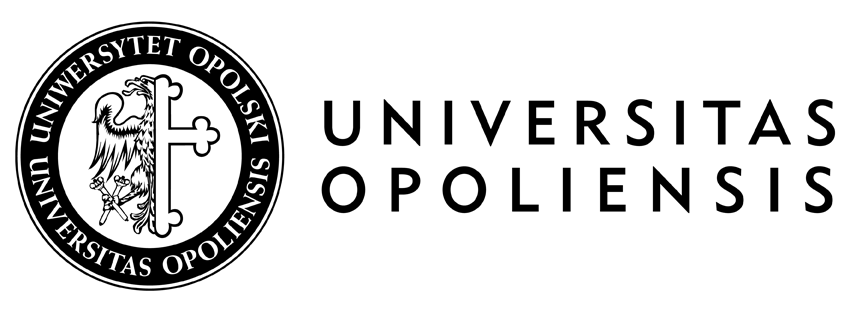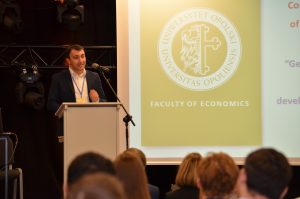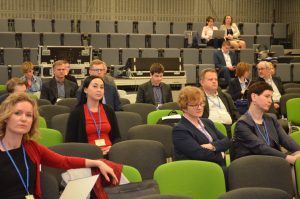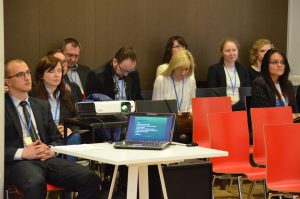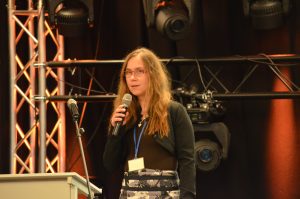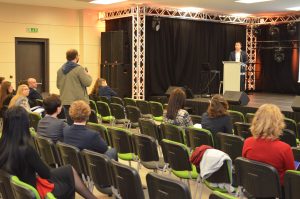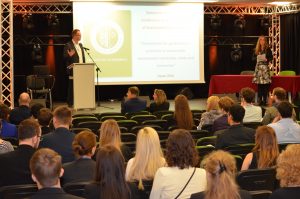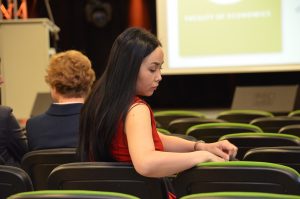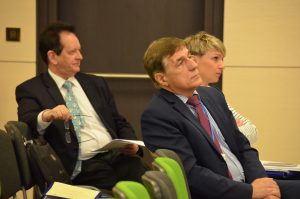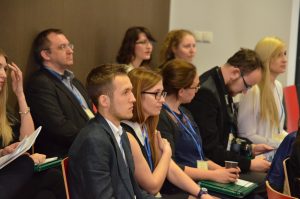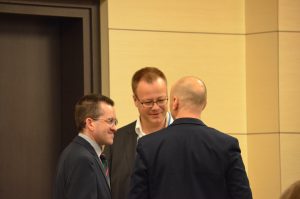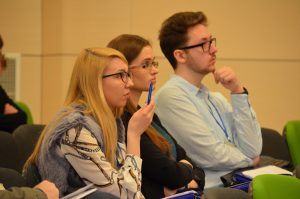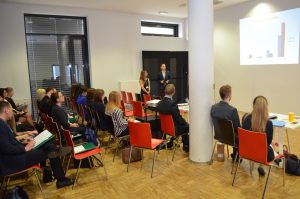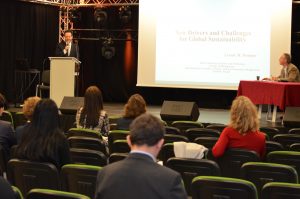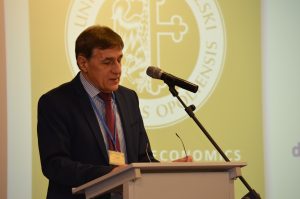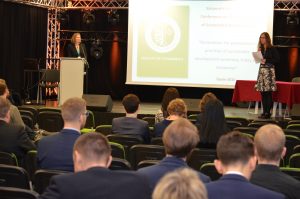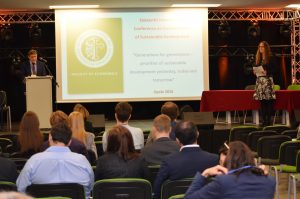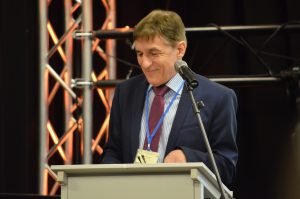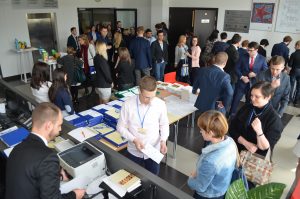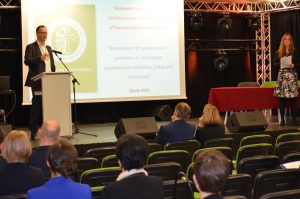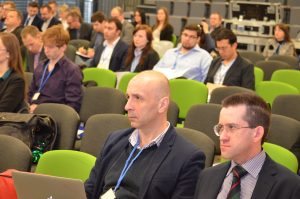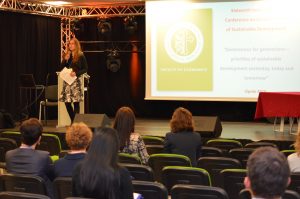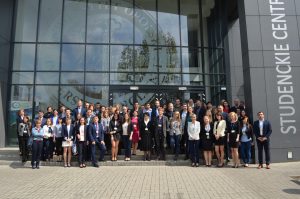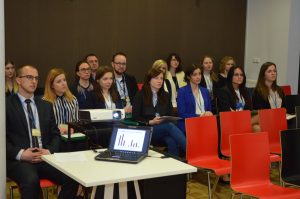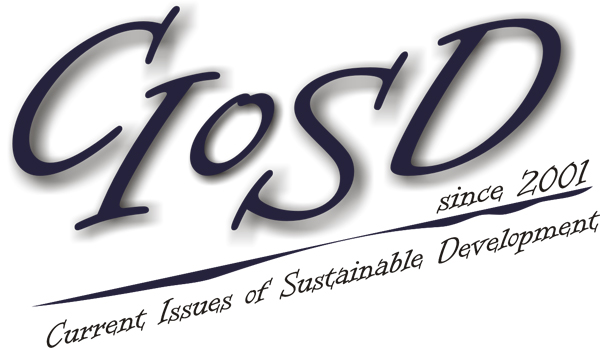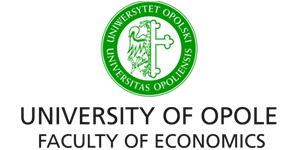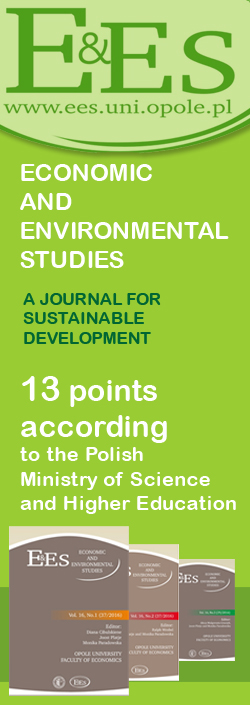The Faculty of Economics of the Opole University held the Sixteenth International Conference on Current Issues of Sustainable Development “Generations for generations – priorities of sustainable development yesterday, today and tomorrow” on 25-26 April 2016 at the Student Activity Centre (SCK) in Opole, Poland. Almost 100 attendees from 8 countries gathered to take part in a rich programme composed of presentations, exhibition of posters and discussin o contemporary problems of sustainable development.
The conference was hosted by:
The Chair of Economic Geography and Spatial Economics together with
the Department of Economic Theory
Student Scientific Association for Sustainable Development oikos Opole at the Faculty of Economics, Opole University (Poland), and:
Hochschule Zittau/Goerlitz (Germany)
Selçuk University (Turkey)
Faculty of Social Sciences, Humanities and Arts, Siauliai University (Lithuania)
Faculty of the Environment, Purkyně University (Czech Republic)
National University of Life and Environmental Sciences of Ukraine
in co-operation with
The Polish Association of Environmental and Natural Resource Economists
Each generation has the responsibility for the quality of environment, which is the basis for subsistence of (not only!) humans and for all socio-economic processes. Current environmental degradation is the result of uncontrolled and greedy behaviour of people all over the world, who are mostly focused rather on their own well-being than on possibilities to keep up the development processes in the future. The necessity of a different view and approach to current and future development capabilities seems to be indisputable. For this reason, each generation should search, develop and implement new solutions in order to strive for sustainable development for the world.
The conference aimed at creating a scientific forum for presentation of research results, exchange of views and experience and for discussion on issues regarding foundations, conditions as well as challenges for sustainable development.
The general aim of the conference was to discuss and analyse:
• responsibility of young, medium and old generations in building capabilities for sustainable development,
• improving common, international dialogue for creating sustainable development patterns,
• institutional and governmental framework for sustainable development,
• challenges in developing sustainable consumption and production,
• challenges for sustainable development in different sectors, e.g. transport, energy, waste management etc.,
• the role of technology in building sustainability.
The conference was expected to give an answer on one of the most important questions: do efforts and actions aimed at sustainable development really lead to sustainability?
Each generation has the responsibility for the quality of environment, which is the basis for subsistence of (not only!) humans and for all socio-economic processes. Current environmental degradation is the result of uncontrolled and greedy behaviour of people all over the world, who are mostly focused rather on their own well-being than on possibilities to keep up the development processes in the future. The necessity of a different view and approach to current and future development capabilities seems to be indisputable. For this reason, each generation should search, develop and implement new solutions in order to strive for sustainable development for the world.
The conference aims at creating a scientific forum for presentation of research results, exchange of views and experience and for discussion on issues regarding foundations, conditions as well as challenges for sustainable development.
List of speakers:
1. JOOST PLATJE (WSB University in Wrocław, Poland)
“Economic principles for policy for sustainable development in a complex world”
2. LESZEK PREISNER (AGH University of Science and Technology in Cracow, Poland)
“New Drivers and Challenges for Global Sustainability”
3. LEVAN PANGANI (Univeristy of Lodz, Poland)
“oikos International – the role of young generations in building the path of sustainable development”
4. MARKUS WILL (Hochschule Zittau/Görlitz, Germany)
“Reflections on ‚true‘ business sustainability”
5. JERZY ŚLESZYŃSKI, PAULINA STACHURA (University of Warsaw, Poland)
“Human Development Index and gender inequality issue”
6. AGATA FERREIRA (ESADE Ramon Llull University, Barcelona, Spain)
“Sustainable development: between the development and sustainability – irreconcilable duality or symbiotic synergy?”
7. DAVID BERGER (Leipzig University, Germany)
“Sustainable development and community mobilization – through failure towards success?”
8. KAROL KOCISZEWSKI (Wrocław University of Economics, Poland)
“The latest solutions in the European Union’s environmental policy – implications for agriculture”
9. JANUSZ ROSIEK (Cracow University of Economics, Poland)
“Determinants of the EU sustainable development policy effectiveness. DEA approach”
10. JUSTYNA DANIELEWICZ (University of Lodz, Poland)
“The sustainable development idea in the management of European metropolitan areas”
11. ALICJA GRACZYK (Wrocław University of Economics, Poland)
“Polish attitudes towards sources of energy generation”
12. ROLANDO GARCIA RAMOS (University of Sonora, Hermosillo, Mexico)
“Energy Efficiency in the Northwest Mexico Electronic Maquiladora”
13. MICHAŁ PTAK (Wrocław University of Economics, Poland)
“The effectiveness of environmental and energy policy instruments”
14. MARTA GOLLINGER-TARAJKO (Cracow University of Economics, Poland)
“Eco-design of energy using products as a tool for sustainable development realization”
15. GRAŻYNA KRZYMINIEWSKA, HANNA PONDEL (Poznań University of Economics and Business, Poland)
“An attempt to assess the sustainability of rural communities of Wielkopolska province”
16. SANTA BUKAUSKAITĖ, MONIKA ARLAUSKAITĖ (Siauliai Univeristy, Lithuania, University of Wrocław, Poland)
“Sustainable cafe”
17. MATHIAS PEYER (University of Potsdam, Germany)
“Consciousness for Sustainable Consumption (CSC) in Different European Countries”
18. AGATA FERREIRA (ESADE Ramon Llull University, Barcelona, Spain)
“When international investment meets sustainable development – painful collision or necessary contribution?”
19. PAULINA SZYJA (Pedagogical University of Cracow, Poland)
“The role of sustainable development indicator’s in the study of the progress of new UN goals”
20. KATARZYNA JAROSZ (International University of Logistics and Transport in Wrocław, Poland)
“Social movements and sustainable approaches to the protection of cultural heritage. Case studies of Rosia Montana in Romania”
21. ANDRZEJ RASZKOWSKI (Wrocław University of Economics, Poland)
“Institutional framework driven sustainable development based on the example of self-government territorial units activity”
22. DOROTA SIKORA-FERNANDEZ (University of Lodz, Poland)
“Urban resilience as a key element of smart city”
23. ECKHARD BURKATZKI (International Institute (IHI) Zittau, Germany), JOOST PLATJE (WSB University in Wrocław, Poland)
“Corporate success and sustainable development within structurally weak regions – Some theoretical and methodical ideas for an empirical research project”
24. JANUSZ REICHEL (University of Lodz, Poland
“Sustainable development as a challenge for society and economy”
25. BARTOSZ BARTNICZAK (Wroclaw University of Economics, Poland)
“Sustainable development concept in Polish strategic documents”
26. DOMINIK DRZAZGA (University of Lodz, Poland)
“New paradigms in spatial planning as a challenges for sustainable development”
27. MAŁGORZATA PŁACZEK (Opole Univeristy of Technology, Poland)
“Technical aspects of microalgae cultivation in photobioreactors”
28. WIOLETTA WRZASZCZ (Institute of Agricultural and Food Economics – National Research Institute, Warsaw, Poland)
“Challenges for sustainable development of agricultural farms”
29. WIKTOR SZYDŁO (Wroclaw University of Economics, Poland)
“Political economy of food and housing crisis in 2000s”
30. KAROLINA BAŃDURA (Opole Univeristy, Poland)
“Sustainable development – a philosophical perspective”
31. ADAM SENASTIAN GÓRSKI (Jan Kochanowski University in Kielce, Poland)
“Territorial marketing as a tool to implement sustainable development in the regions”
32. AGNIESZKA SOBOL (University of Economics in Katowice, Poland)
“The views of the young generation of a city as a common good”
33. Agata Rudnicka
“Good practices of socially responsible corporations and
real environmental challenges”
34. PIOTR CZEMBROWSKI (University of Lodz, Poland)
“The economic valuation of urban green spaces as a voice in the debate over their role in sustainable cities”
35. MICHAŁ KUZIA (Gdynia Maritime University, Poland)
“Sustainable mobility challenges – Gdynia Maritime University case study”
36. BARTOSZ FORTUŃSKI (Opole University, Poland)
“Impact of intra-EU trade for Polish emission of CO2”
37. ZHANAR KONYS (L. N. Gumilyov Eurasian National University, Astana, Kazakhstan)
“The influence of development level of different generations on the innovative development”
38. MATEUSZ KUROWSKI (University of Zielona Gora, Poland)
“Through social capital to sustainable development”
39. ANDRZEJ STRZAŁKOWSKI (University of Warsaw, Poland)
“Sociology of sociology – strengthening the role of social sciences as a new priority of sustainability policy”
40. KATARZYNA NEGACZ (Warsaw School of Economics, Poland) READ MORE >>
